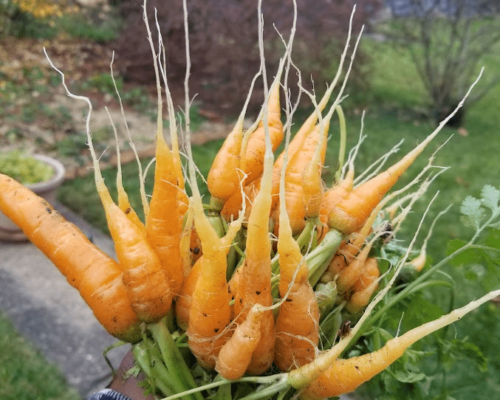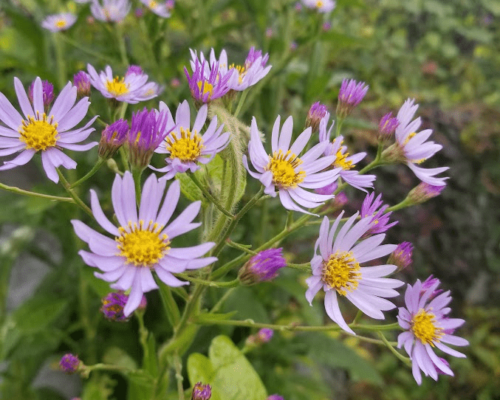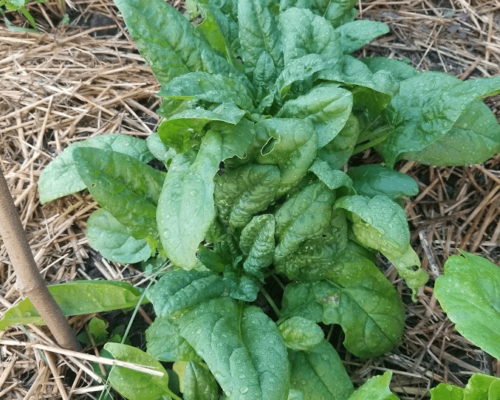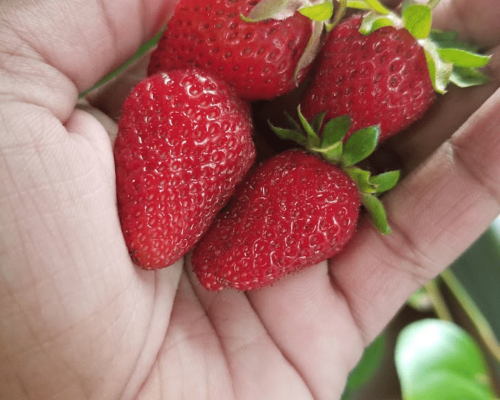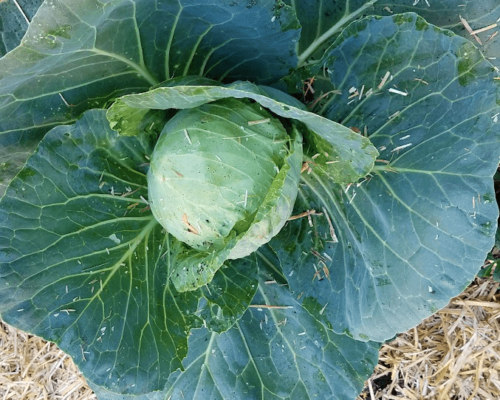This Grower’s Spotlight features Mahogany Thaxton, a 2022 Braddock Farm workshare participant and a Grow Pittsburgh Member. Mahogany grew up in Pittsburgh and is working to better her community through her career and life. Part of this has been pursuing a master’s degree in library science and learning more about urban farming. Hear from Mahogany about her passion to make a difference in her community through a lens of lifetime learning.
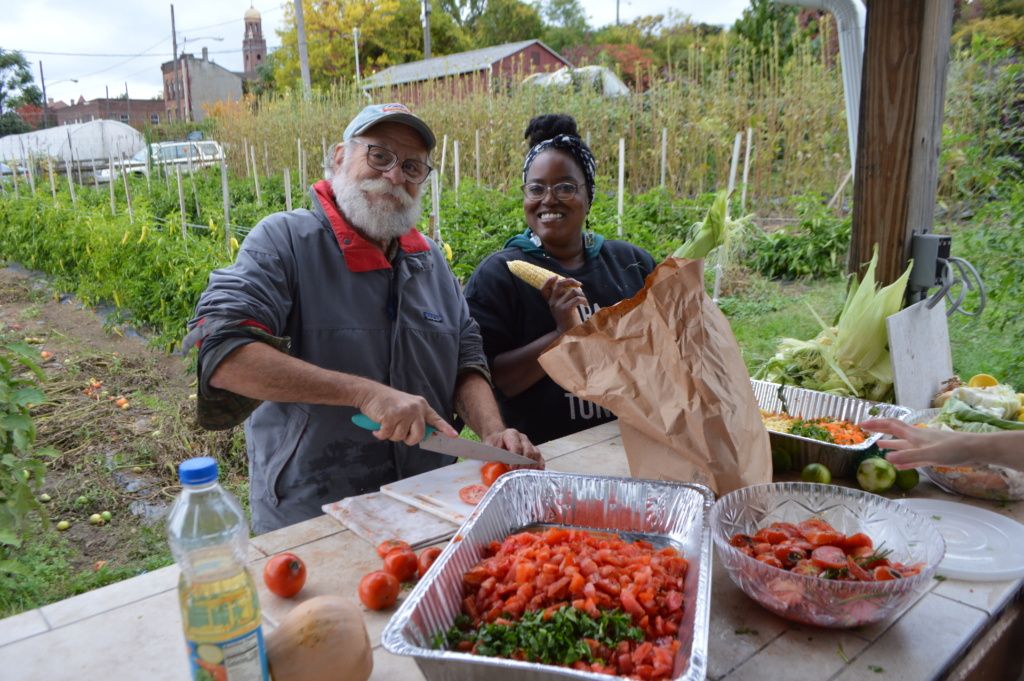

Grow Pittsburgh: Tell us a bit about yourself.
Mahogany: I’m originally from McKeesport, Pennsylvania and now live in Homestead in a house I affectionately call my “old lady.” I’m a middle-aged Black woman, nonprofit fundraising consultant, soon to be library school graduate (support your local a library!), pessimist if I’m not careful, and all around lifelong learner. My partner lives in Braddock, we have a three-legged dog, and often pass Braddock Farm on our walks. Our dog loves to pretend to be a farm dog at Braddock Farm.
Community building, community wealth sharing, and resource sharing are important aspects of my life. My experiences as a fundraiser asking for money and as a philanthropic advisor to those giving money to nonprofits has helped me see how connected we all are, including how we direct our money – how much money we have, where we shop, who we give to, what information and resources we have to make the decisions we make including the food we eat. I think a lot about what being in relationship with plants and nature means when we think about community.
I’m currently exploring new ways of being in this world including how I can align my values and the pace of life that I want with my labor, so, I made a big leap and left my full-time job in January 2022. This new way of being in the world includes learning how to farm along with getting a master’s in library science degree, and sharing fundraising practices that shift from donor’s having power because of their money to donors being partners with the organizations they support, leaving decision making to those who are closest to the issues. In all these areas, community is first.
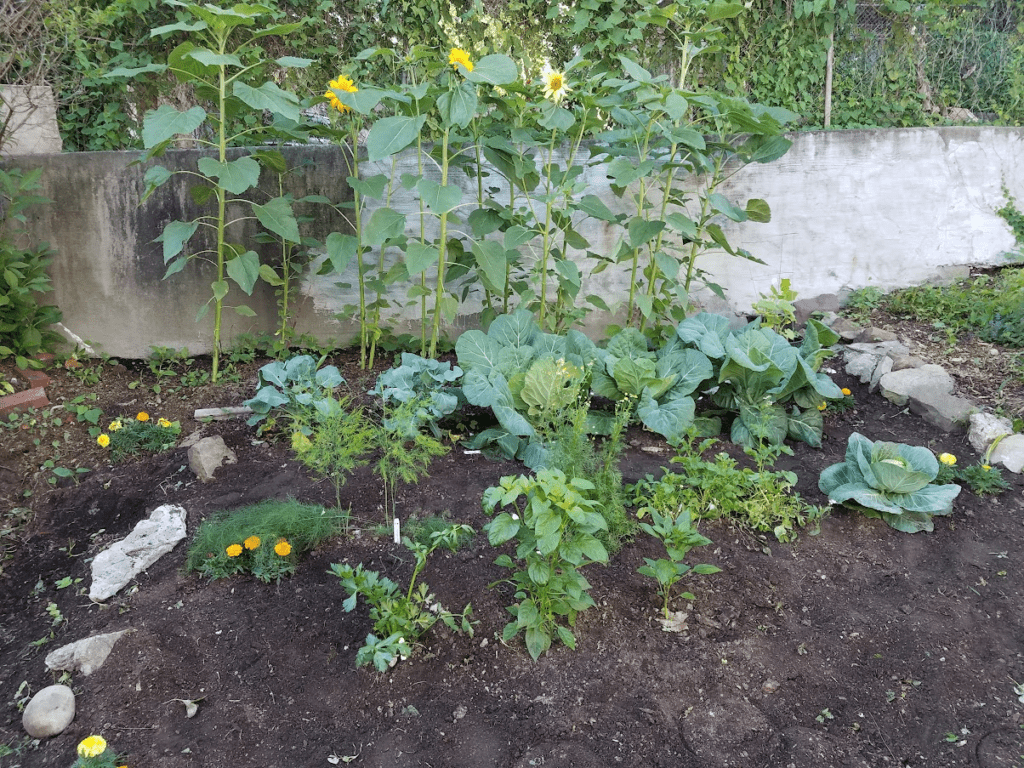
GP: How did you get started growing food?
Mahogany: I feel the desire and importance of growing food in my bones, but it’s new in practice to me. Growing up I have vague memories of a small garden in my paternal grandma’s backyard in McKeesport and vivid memories from other people’s descriptions of a huge garden at my maternal great grandma’s in Blythedale, Pennsylvania, but I wasn’t connected to growing food throughout my teenage years and early 20s. About a decade ago, I started to think critically about my relationship with food overall, thinking about health and access to food. I was becoming more adventurous and curious about food. Believe it or not, I was a Lean Cuisine and Smart Ones girl and my freezer was always stocked! As I began to explore food and food systems I became interested in cooking my own food and understanding the ingredients that I was using, and that progressed into wanting to grow my own food. I had several friends along the way who grew their own food who were and still are an inspiration today.
I felt like it was important to set my life up in spaces where I could grow my own food and be in tune with nature. I began learning from my neighbors and my friends, and moved into a house where I could have a cute little garden with a roommate. I had a few unsuccessful gardens, but I just continued to learn and to try.
GP: How did you become involved at Braddock Farms?
Mahogany: As I became more interested in growing my own food I started to look for more skill-building opportunities. I call myself a mini-prepper because I can see that the world is changing – it may not be apocalypse level but things are going to look different in a few decades if not sooner. One of the most important humans in my life was and is my grandfather – self-reliance for self and family was important to him and has become important to me. Growing your own food is a key point of being able to provide for myself, my family, and my community. I love to learn and share so part of learning to grow my own food is wanting to share what I learn with others, who can share what they learn, and so on. Let’s build community knowledge!
I tend to be an overthinker which can hold me back sometimes. Spreadsheets and planning are great, but sometimes you just need to start planting instead of focusing on if you have the right soil composition or seed varieties.
So when I made the decision to leave my full-time job earlier this year, I wanted to set my life up in a way that supported the type of experiences that I wanted to have. Less overthinking and more putting plants into the dirt. So I began looking for experiences that would allow me to learn hands-on.
My partner lives in Braddock so we go to the Farm Stand regularly for produce or to pick up seedlings. It’s always been a really welcoming space so when I learned about the workshare and pre-apprentice programs in your newsletter I decided to apply.
I work four hours a week from April – October and do a little bit of everything. I’ve transplanted onions, tomatoes, lettuce, started seeds, practiced trellising, learned how to use all of the farm tools and equipment, learned when a green pepper has that harvest ready crunch, watched okra grow for the first time, planted bok choy using a seeding machine. It’s been interesting to see the cycle of what happens on the farm from seed to harvest. It’s a relatively small space but we can grow so much food if we time it right.
GP: What are some lessons growing food has taught you?
Mahogany: It’s hard! I knew farming was labor intensive but you really don’t realize just how physically demanding the work is until you’re doing it. It’s definitely given me an even bigger appreciation for farm workers and advocating for healthcare for everyone. Farming takes a toll on you physically and mentally.
I’ve also really enjoyed learning about the transformations in nature and stopping to appreciate parts of each plant. I’ve become obsessed with okra this year, it’s such a beautiful plant. And eggplant, the fruit is beautiful but the leaves are absolutely divine. They’re so soft and furry.
It’s been interesting to understand how vegetables and seeds are bred to produce specific plants. I really enjoyed watching crops that start out the same but grow into something completely different like Brassicas. There’s something beautiful in each crop and I’ve enjoyed having the opportunity to see that.
 GP: What’s something you wish more people knew about the work you do?
GP: What’s something you wish more people knew about the work you do?
Mahogany: Farming is part of an entire ecosystem, it’s not just about planting food. The soil, bugs, animals, access to water… all of that is a part of farming and growing food. If we strengthen each part of that ecosystem we will have a stronger and healthier community overall.
It’s more than just the soil in your yard, it’s about the soil quality in your community. The water and air quality in your community really impact overall health. It’s easy to forget that in a lot of communities.
I think in Braddock those things go from theory to reality because of the active steel mill neighboring the community. I had always worried about it, but working on the farm (which is directly in front of the mill) I’ve learned a lot more about it. There are days where farm staff have to wear masks because the air quality is so bad and that makes it impossible to ignore.
GP: What does being a part of Braddock Farms’ in recent years mean to you and how do you hope to continue the impact?
Mahogany: As someone who is in the community regularly with my partner, I’ve always appreciated the welcoming atmosphere of the farm. I love watching people line up for Farm Stand days or come to events. It’s a great place for community members to connect with each other and I love that most of the customers are Braddock residents.
As I’ve been working at the farm, I’ve really enjoyed starting conversations with people that stop by during the work day. I love talking to people about what we’re doing and asking about their gardens. There is so much knowledge to learn and share.
GP: Why do you support Grow Pittsburgh?
Mahogany: I believe everyone should have access to fresh, local, sustainably grown food and be able to gain the knowledge to grow that food themselves. I love that Grow Pittsburgh’s core programming is to teach others and they do so through community partnerships, providing access, knowledge, and resources for communities to grow food and relationships.
GP: Which of GP’s core values, found here, do you resonate with and why?
Mahogany: I know this sounds like a non-answer, but I resonate with all of them and think they are connected! I think all of them work together to create environments where all people can thrive, even through disagreements. The key is how does GP act on these values and imbed them in organizational practices.
Things growing in Mahogany’s garden

